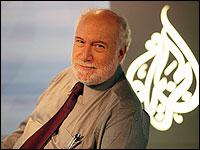Transcript
BROOKE GLADSTONE:
For nearly two years, David Marash has been the senior Washington anchor of Al-Jazeera English. Launched in 2006, the channel boasted broadcasting centers in Doha, Kuala Lumpur, London and Washington, D.C., and bureaus worldwide.
Marash was one of Al-Jazeera's most prestigious hires, bringing years of experience as a Nightline correspondent. We spoke to him shortly before he took the job and he said that the news channel, the brainchild of the Emir of Qatar, had no particular political axe to grind.
DAVID MARASH:
Al-Jazeera is almost perfectly clear of any national interest or any dictated political policy.
BROOKE GLADSTONE:
No longer. Last week, David Marash announced he was leaving Al-Jazeera English, citing anti-American bias and too much control exerted from Al-Jazeera headquarters in Doha. He said the editorial climate began to change last year after the American vice-president visited the region.
DAVID MARASH:
When Dick Cheney was in the Gulf bracing America's allies for possible action against Iran, the Gulf States essentially told Cheney that this was a terrible idea and not one that they were prepared to support in any way, and, from that point forward, started moving in ways that were dramatically independent of American foreign policy.
Also around that time, Qatar started to make up its long-standing differences with Saudi Arabia and Al-Jazeera English started to slide away from its original goal of being a literally cosmopolitan channel of all the world viewed from all the world's viewpoints to something closer to Al-Jazeera Arabic, which is a terrific, straight-up news organization but one which reports from the point of view and to the interests of a world basically defined by the Arabic language, the Islamic religion and the Middle Eastern regional interest.
BROOKE GLADSTONE:
You cited anti-American bias in your decision to leave Al-Jazeera, but you also told us that the reporters that were covering your departure have distorted the meaning of anti-American bias. I don't quite follow.
DAVID MARASH:
What I ought to do is simply define for you what I mean by anti-American bias. Everywhere else in the world, most notably Latin American and Africa and the Middle East, Al-Jazeera's bureaus are manned by people from the region that they are covering. They are covered with real authenticity and insight.
And, you know, our two American reporters were able to bring that insight, but a lot of the people, the majority who were brought in, simply did not know America well enough and didn't have the time to learn it fast enough before they were on the air putting on reports that seemed to me to be tendentious or shallow.
Everybody else's elections have been covered by teams from the region. Super Tuesday was covered by a team that was largely sent from Doha.
BROOKE GLADSTONE:
Why do you think Al-Jazeera is skimping on resources for U.S. coverage? Is it simply because the U.S. audience is so small, or is there another reason?
DAVID MARASH:
I think it's true that part of the reason is that Al-Jazeera English's American audience is almost exclusively limited to the Internet, which may make it of less importance to them, although nobody has ever copped to that to me.
But it's also true that I think there is a resentment and anger against America that is out there in the world. And I think that a kind of condescending, specifically English resentment and anger at the United States does work itself out in editorial decisions being made by the channel.
BROOKE GLADSTONE:
What do you mean English resentment? You mean from the Brits working at Al-Jazeera?
DAVID MARASH:
Exactly. 1776. Terrible mistake. [LAUGHS] Let us teach you the error of your ways.
BROOKE GLADSTONE:
Was there a particular incident at Al-Jazeera that clinched your decision to leave?
DAVID MARASH:
A proposed job change got me thinking about it seriously.
BROOKE GLADSTONE:
What was that?
DAVID MARASH:
To stop anchoring and simply become a full-time correspondent.
BROOKE GLADSTONE:
Was that a demotion?
DAVID MARASH:
They said no, but I know better. Of course.
BROOKE GLADSTONE:
Is Al-Jazeera any worse in its coverage of the United States than most American television networks are in their coverage of the Middle East?
DAVID MARASH:
That's a fair point, Brooke. In many ways, Al-Jazeera's coverage of the United States is similar to CNN's coverage of Israel or Saudi Arabia, which is to say that it's very much crisis-driven and shy on nuance and real depth of knowledge.
So by conventional standards, it's no worse, but by the standards that I signed up to do, and my expectations of what I put my mug and name and reputation out there for Al-Jazeera for, was something more than that.
BROOKE GLADSTONE:
David thank you very much.
DAVID MARASH:
My pleasure, Brooke.
BROOKE GLADSTONE:
David Marash is the former senior Washington anchor of Al-Jazeera English. He's started work on a book about the global competition for political and cultural influence through television news.
